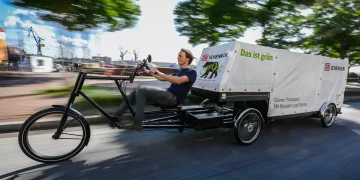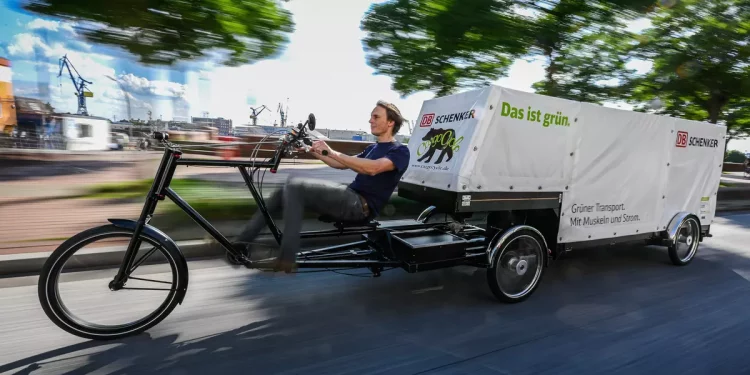Deutsche Bahn (DB) is making waves in the last-mile delivery landscape. In a recent announcement, DB revealed plans to expand its use of electric cargo bikes for urban deliveries. This innovative move signifies the company’s commitment to tackling urban congestion and emissions while offering a more sustainable solution for last-mile deliveries in crowded city centers.
The Last-Mile Challenge in Urban Areas:
The final leg of a delivery journey – the last mile – presents unique challenges in urban environments:
- Traffic Congestion: Delivery vans and trucks often get stuck in congested city streets, leading to delays and frustration for both businesses and customers.
- Limited Parking: Finding parking space for delivery vehicles in densely populated areas can be challenging and time-consuming.
- Environmental Concerns: Delivery vehicles contribute to air and noise pollution in city centers, impacting residents and the environment.
Deutsche Bahn Shifts Gears with E-Cargo Bikes:
DB’s expansion of e-cargo bikes offers a potential solution:
- Navigating Congestion: E-cargo bikes can maneuver through traffic jams and congested streets more efficiently than traditional delivery vehicles.
- Parking Flexibility: E-cargo bikes require less parking space, making deliveries in crowded urban areas easier.
- Zero-Emission Deliveries: Electric power eliminates tailpipe emissions, contributing to cleaner air and a quieter urban environment.
Benefits for Businesses, Cities, and the Environment:
DB’s e-cargo bike initiative offers several advantages:
- Faster and More Reliable Deliveries: E-cargo bikes can potentially navigate traffic and make deliveries faster in congested areas.
- Reduced Operating Costs: E-cargo bikes are potentially less expensive to operate and maintain compared to traditional delivery vehicles.
- Enhanced Urban Sustainability: Reduced congestion and zero-emission deliveries contribute to a more sustainable urban environment.
Challenges and Considerations of E-Cargo Bike Delivery:
Despite the benefits, challenges remain for large-scale e-cargo bike adoption:
- Cargo Capacity and Range: E-cargo bikes may have limitations on payload capacity and delivery range compared to traditional vans.
- Weather Dependence: Deliveries with e-cargo bikes might be impacted by adverse weather conditions.
- Infrastructure Development: Creating dedicated lanes and safe parking spaces for e-cargo bikes within cities requires infrastructure development.
A Pedal-Powered Push for Sustainable Cities:
Deutsche Bahn’s e-cargo bike initiative reflects a significant step towards sustainable urban logistics:
- A Pioneering Example: DB sets a positive precedent, encouraging other logistics companies and cities to explore e-cargo bikes for last-mile delivery.
- Optimizing Urban Delivery Networks: E-cargo bikes complement existing delivery methods, creating a more efficient and sustainable urban delivery ecosystem.
- A Multimodal Approach: Integrating e-cargo bikes with other sustainable modes of transport can create a greener last-mile delivery network.























